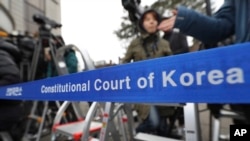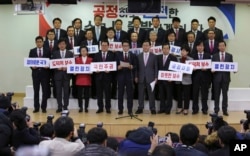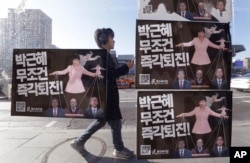In South Korea the process for removing a democratically elected leader from office seems to be to impeach first and ask questions later.
In early December the National Assembly voted overwhelmingly to impeach President Park Geun-hye on charges of abuse of power, bribery, and infringement of press freedom in connection with an alleged multi-million dollar influence peddling scandal.
The impeachment motion also charges the president with negligence for the government’s purported inept response to the 2014 Sewol ferry disaster that killed over 300 people, many of them school age children.
However, the vote was held before a newly appointed independent counsel began its investigation into possible executive branch wrongdoings, and before a special legislative committee began holding televised hearings on the allegations of misconduct by the president. Both of these investigations are still underway.
“It is an upside down procedure. Approval of the impeachment motion itself has very important legal significance, but it is problematic that (the approval) was done politically, without clear facts, but with suspicions,” said Lee In-ho, a professor of law at Chung-Ang University in Seoul.
Court hearings
Now it is up to the nine judges on the Constitutional Court to uphold the impeachment vote or reinstate Park, who has been suspended from office, but continues to live in the presidential Blue House.
The judicial review process is being conducted as a trial where Park and her lawyers can mount her defense and prosecutors representing the National Assembly can make the case for her removal from office.
To uphold the impeachment ruling, Professor Lee says, the Constitutional Court will require clear evidence the president committed “a grave violation of constitutional law.”
Park is accused of colluding with her longtime friend, Choi Soon-sil, to force or bribe Korean conglomerates to donate over $65 million to two dubious foundations, and to turn a blind eye while Choi funneled some of the funds and lucrative side contracts to companies owned by herself and her friends.
After the impeachment vote the president said she would plead her case before the Constitutional Court but she has refused to appear when called at the first two hearings this week.
Professor Lee says the prosecution has been hampered by constitutional constraints that restrict the ability of the judicial and legislative branches to investigate the president or force her to testify in court.
“It is impossible to investigate the president in principle, but the prosecution can try to find, through its investigation procedure, how deep the president is involved. It is the important issue of the impeachment, but such evidences have not (yet) been presented,” said Lee.
Park recently met with reporters to deny the charges against her as “fabrication and falsehood.” She also claimed she has been “totally framed,” but said she could not elaborate as the matter is under investigation.
The suspended president maintains that her support for the foundations were in the national interest, and insists she never personally benefited during her 18 years of public service. Prior to the impeachment vote the president offered three public apologies for not being aware that some of her close associates may have been involved in some wrongdoings.
Rep. Kwon Seong-dong, who leads the National Assembly's judiciary committee, criticized Park for talking to the press while refusing to appear in court.
On Thursday Park was represented in court by Lee Joong-hwan, a former prosecutor, and Kwon Sung-dong, a leader of the ruling Saenuri Party legislators on the parliamentary impeachment proceedings committee.
Co-conspirators
The president cannot be charged with a crime while in office but could be indicted if the impeachment is upheld.
Justice Ministry prosecutors have named Park an accomplice of her friend Choi Soon-sil, who has been charged with abuse of authority, coercion and attempted fraud, and is currently in custody in a Seoul detention facility.
On Thursday Choi was brought to the Seoul Central District Court to face the first hearing of her criminal trial. Choi told the court she is "facing much unfairness."
Lee Kyung-jae, Choi's lawyer, denied the charges saying, "There is no truth in saying the accused (Choi) was involved in collecting funds for foundations from conglomerates."
One of Park’s aides faces similar charges and another has been indicted for leaking government secrets to Choi, who held no official position or security clearance. Both are still awaiting trial.
Choi’s daughter Chung Yoo-ra is being held in custody in Denmark, as she tries to fight extradition to South Korea. Chung has not been charged but investigators want her to answer allegations that she received favors in the form of admission to a prestigious university and corporate funding for her equestrian Olympic training because of her mother’s ties to the president.
Race against time
By not cooperating, Park and her defense team may be trying to delay the proceedings to take advantage of impending term limits for two justices that could deadlock the court.
The nine member Constitutional Court must reach the required quorum of six justices voting to uphold the impeachment motion. However the term of the court's Chief Justice Park Han-chul ends in late January and a second Justice Lee Jung-mi ends his tenure in March. The Constitutional Court justices cannot be replaced until the impeachment issue is resolved.
The impeachment trial can last up to 180 days but if it lingers into March there will be only seven justices left on the bench, but an impeachment ruling will still require six justices to vote to uphold.
Public anger
President Park’s single five-year term ends in 2018 but she has lost virtually all public support due to the scandal.
The weeks prior to the impeachment vote were marked by massive weekly protests across Korea. Park’s approval rating dropped to just 4 percent and a recent poll found that 80 percent of South Koreans support her impeachment.
If the court rejects the impeachment motion, it is expected that large-scale demonstrations would again erupt to force the president to resign.
If the court upholds the impeachment vote, Park will be the first democratically elected South Korean president to be forced from office. In 2004, the National Assembly impeached then-president Roh Moo-hyun, but after 63 days of deliberation the court overturned the motion and returned Roh to power.
Much of the public outrage over this scandal has been driven by the portrayal in the Korean media of Choi Soon-sil as a malevolent shaman who secretly controlled the naive Park, directing both presidential policies and subordinates without holding an official position in government.
Park’s relationship with Choi dates back to the 1970s, when Park's father, Park Chung-hee, ruled South Korea for 18 years after coming to power in a coup.
Choi’s father, Choi Tae-min, a religious cult leader who founded a sect called the Eternal Life Church, became a mentor to Park while she was acting as first lady, after her mother was killed during an assassination attempt on Park Chung-hee.
Youmi Kim contributed to this report.








